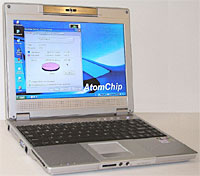 UPDATE – Thanks for the number of people who have written to us about this one, lead by Matt Lacey.
UPDATE – Thanks for the number of people who have written to us about this one, lead by Matt Lacey.
When originally checking the background for the story, we looked at the CES site finding AtomChip had a stand at CES _but_ that they were listed as a CES Innovations 2005 Awards Honorees.
The AtomChip.com domain is registered to Shimon Gendlin, who filed a patent on November 29, 1996 for ‘Non-volatile record carrier with magnetic quantum-optical reading effect and method for its manufacture‘, which was granted on November 24, 1998.
It looks like we, like many other publications, could well have been had on this one. If we have, hats off to ‘Shimon Gendlin’ who’s done everything he could have done to make it look real.
So be it as you choose … here’s the original story.
Research and development company, Atom Chip Corporation, have unveiled a beast of a laptop – the competition-frying 6.8GHz AtomChip SG220-2 sporting a TeraByte of RAM and 2 TeraBytes of storage.
With enough firepower to make the latest high-end laptops look like backfiring peashooters, this monster achieves its breakneck speeds by dispensing with hard disk drives and thus increasing system stability by generating less heat and vibration from rattling disk operations.
The laptop uses new Quantum and Quantum-Optical devices for storing and processing information, with the machine being completely based on solid state AtomChip optoelectronics (whatever they are).
These non-volatile Quantum-Optical RAM wotsits increase the speed of the system, removing the need to refresh information after every cycle of reading of information, as with regular RAM.
 The 6.8GHz behemoth is powered by AtomChip’s Quantum II processor (or four 1.7GHz Intel Pentium M processors) with a terabyte of Quantum-Optical non-volatile RAM (NvIOpSRAM-SODIMM 200-pin) onboard.
The 6.8GHz behemoth is powered by AtomChip’s Quantum II processor (or four 1.7GHz Intel Pentium M processors) with a terabyte of Quantum-Optical non-volatile RAM (NvIOpSRAM-SODIMM 200-pin) onboard.
The new non-volatile Quantum-Optical RAM increases the speed of the system as the need to refresh information after every cycle of reading of information (like regular RAM) doesn’t exist any more.
Even the most obsessive MP3 file collector will have serious problems filling the colossal 2TB of non-volatile Quantum RAM storage space onboard (NvIOpRAM-ATA IDE).
Compared to these eye-watering specs, it’s a surprise to see that the screen’s a bit of a squinter, offering just a 12.1″ WXGA (1280 x 800) display.
The actual laptop looks a bit rubbish too, bedecked out in a ‘High Street’ bog standard silver finish with a design that won’t be troubling Sony and Apple execs.
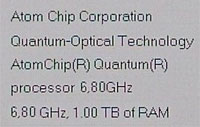 Despite the nation-threatening amount of power on hand, Atom Chip are claiming an impressive battery life of approximately 8 hours for the AtomChip II processor and 3 hours for the 4 x Intel Pentium M processor version.
Despite the nation-threatening amount of power on hand, Atom Chip are claiming an impressive battery life of approximately 8 hours for the AtomChip II processor and 3 hours for the 4 x Intel Pentium M processor version.
The company will be showcasing their Billy Whizz laptop at the Consumer Electronic Show (CES) held in Las Vegas in January 2006.
Pricing has yet to be announced, but I suspect we’re talking ‘re-mortgaging the house’ here.
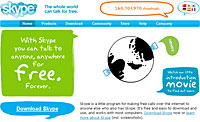 Skype has slapped hands and manfully patted backs with German network operator E-Plus as the VoIP giant secures their first 3G partnership.
Skype has slapped hands and manfully patted backs with German network operator E-Plus as the VoIP giant secures their first 3G partnership. The busy-bee Skypesters are said to be already hatching up schemes with a number of major handset and headset manufacturers – including Motorola – to develop a broader range of offer Skype-ready devices
The busy-bee Skypesters are said to be already hatching up schemes with a number of major handset and headset manufacturers – including Motorola – to develop a broader range of offer Skype-ready devices Skype currently claims more than 2.8 million Skype users in Germany.
Skype currently claims more than 2.8 million Skype users in Germany. In a damning blow to the UK government’s love affair with identity cards, a British criminologist has warned that the new technology could actually increase, rather than solve, the problem of identity theft and fraud.
In a damning blow to the UK government’s love affair with identity cards, a British criminologist has warned that the new technology could actually increase, rather than solve, the problem of identity theft and fraud. “Studying the way that individuals disclose sensitive information would be far more valuable in preventing identity fraud than the evolution of technologically advanced but ultimately fallible measures to prevent misuse of personal information after it has been obtained,” she added.
“Studying the way that individuals disclose sensitive information would be far more valuable in preventing identity fraud than the evolution of technologically advanced but ultimately fallible measures to prevent misuse of personal information after it has been obtained,” she added. Prototype cellphones capable of transmitting data faster than a startled squirrel on speed have been demonstrated by NTT DoCoMo in Japan, according to the New Scientist.
Prototype cellphones capable of transmitting data faster than a startled squirrel on speed have been demonstrated by NTT DoCoMo in Japan, according to the New Scientist. During the tests, another smartypants wireless networking trick was employed to send data via various routes across a network to further increase data capacity.
During the tests, another smartypants wireless networking trick was employed to send data via various routes across a network to further increase data capacity.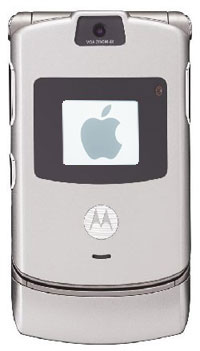 Pop stars are falling over themselves to fill their pockets with corporate cash as the Apple/Motorola iTunes phone promotion machine switches into overdrive.
Pop stars are falling over themselves to fill their pockets with corporate cash as the Apple/Motorola iTunes phone promotion machine switches into overdrive. The Brand Republic article goes on to say that, “The ads may debut from next week, at the same time the Motorola phone with iPod personal music system is launched.”
The Brand Republic article goes on to say that, “The ads may debut from next week, at the same time the Motorola phone with iPod personal music system is launched.”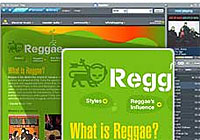 For the first time since its UK launch May 2004, the online music store Napster has dished the dirt on its usage and membership figures for the UK.
For the first time since its UK launch May 2004, the online music store Napster has dished the dirt on its usage and membership figures for the UK.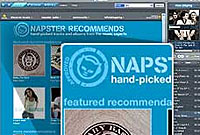 This represents an amazing turnaround for Napster who famously started life as the brainchild of an 18-year-old college dropout named Shawn Fanning in 1999.
This represents an amazing turnaround for Napster who famously started life as the brainchild of an 18-year-old college dropout named Shawn Fanning in 1999.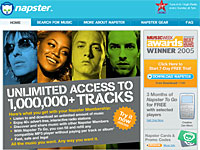 Napster folded in September 2002, but the brand was revived as a legal P2P service by the owners of the Napster name Roxio in 2003, quickly growing to become a major competitor for market leader iTunes.
Napster folded in September 2002, but the brand was revived as a legal P2P service by the owners of the Napster name Roxio in 2003, quickly growing to become a major competitor for market leader iTunes. The boffins at the US National Science Foundation (NSF) have proposed “re-engineering” the Internet to create a whizz-bang updated version that connects all kinds of devices with built in security and robustness.
The boffins at the US National Science Foundation (NSF) have proposed “re-engineering” the Internet to create a whizz-bang updated version that connects all kinds of devices with built in security and robustness. The goals of the GENI Initiative include a new core functionality for the Internet, with new naming, addressing, and identity architectures; enhanced capabilities, including additional security architecture and a design for high availability; and new Internet services and applications.
The goals of the GENI Initiative include a new core functionality for the Internet, with new naming, addressing, and identity architectures; enhanced capabilities, including additional security architecture and a design for high availability; and new Internet services and applications. UK Online have officially joined the 24Mbps broadband party by announcing the October launch of their own broadband ADSL2+ based product.
UK Online have officially joined the 24Mbps broadband party by announcing the October launch of their own broadband ADSL2+ based product. UK Online has been conducting technical trials of its ADSL2+ service since March of this year and their 24Mb broadband service should be available in October for under £30 (~$55 ~€43) a month.
UK Online has been conducting technical trials of its ADSL2+ service since March of this year and their 24Mb broadband service should be available in October for under £30 (~$55 ~€43) a month. Be Unlimited
Be Unlimited Temptingly, there’s no connection fee for new users with a free Wi-Fi-enabled modem lobbed in for no charge (the company will be using DSLAMs from Alcatel, and a Thompson 716g V5 wireless modem, optimised for VoIP and video-streaming applications.)
Temptingly, there’s no connection fee for new users with a free Wi-Fi-enabled modem lobbed in for no charge (the company will be using DSLAMs from Alcatel, and a Thompson 716g V5 wireless modem, optimised for VoIP and video-streaming applications.)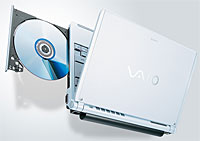 Large pools of drooling saliva formed around our mouse mats this morning when we caught sight of Sony’s new range of slimline laptops, the Sony T.
Large pools of drooling saliva formed around our mouse mats this morning when we caught sight of Sony’s new range of slimline laptops, the Sony T. There’s also healthy 512Mb of RAM (upgradeable up to 1.5Gb) onboard, 40 to 60Gb HDD space and a DVD burner
There’s also healthy 512Mb of RAM (upgradeable up to 1.5Gb) onboard, 40 to 60Gb HDD space and a DVD burner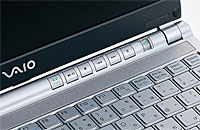 As ever, it’s the lucky Japanese who get to play with the cool toys first, with the Sony T going on sale in Japan from September 10th onwards.
As ever, it’s the lucky Japanese who get to play with the cool toys first, with the Sony T going on sale in Japan from September 10th onwards. From deep within the Microsoft base, Bill Gates has pulled a few levers and dispatched a corporate grabbing tentacle in the direction of Teleo, a privately held provider of VoIP software and services.
From deep within the Microsoft base, Bill Gates has pulled a few levers and dispatched a corporate grabbing tentacle in the direction of Teleo, a privately held provider of VoIP software and services.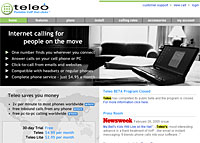 The San Francisco-based outfit Teleo was founded just two years ago and got as far offering a beta PC to PC or standard phone Skype-like VoIP service with click-to-call dialing through Microsoft Outlook and Internet Explorer before Gates grabbed the product.
The San Francisco-based outfit Teleo was founded just two years ago and got as far offering a beta PC to PC or standard phone Skype-like VoIP service with click-to-call dialing through Microsoft Outlook and Internet Explorer before Gates grabbed the product. Terms of the deal haven’t been disclosed, but Microsoft have said that members of the Teleo executive team will continue to work closely with MSN, while some Teleo product developers are expected to shuffle across and join MSN.
Terms of the deal haven’t been disclosed, but Microsoft have said that members of the Teleo executive team will continue to work closely with MSN, while some Teleo product developers are expected to shuffle across and join MSN.